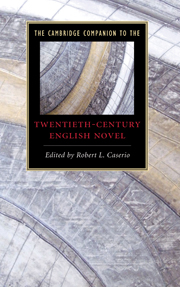Book contents
- Frontmatter
- Introduction
- 1 The art of English fiction in the twentieth century
- 2 The British Empire and the English modernist novel
- 3 Realism and rebellion in Edwardian and Georgian fiction
- 4 The Great War in English fiction
- 5 Postwar modernism in the 1920s and 1930s: The mammoth in the basement
- 6 Regionalism in English fiction between the wars
- 7 Ireland and English fiction
- 8 Feminist fiction
- 9 Working-class fiction across the century
- 10 World War II, the welfare state, and postwar “humanism”
- 11 The Windrush generation
- 12 History in fiction
- 13 Postmodernisms of English fiction
- 14 Detectives and spies
- 15 The post-consensus novel: Minority culture, multiculturalism, and transnational comparison
- 16 An absurd century: Varieties of satire
- 17 The other side of history: Fantasy, romance, horror, and science fiction
- Further reading
- Index
4 - The Great War in English fiction
Published online by Cambridge University Press: 28 July 2009
- Frontmatter
- Introduction
- 1 The art of English fiction in the twentieth century
- 2 The British Empire and the English modernist novel
- 3 Realism and rebellion in Edwardian and Georgian fiction
- 4 The Great War in English fiction
- 5 Postwar modernism in the 1920s and 1930s: The mammoth in the basement
- 6 Regionalism in English fiction between the wars
- 7 Ireland and English fiction
- 8 Feminist fiction
- 9 Working-class fiction across the century
- 10 World War II, the welfare state, and postwar “humanism”
- 11 The Windrush generation
- 12 History in fiction
- 13 Postmodernisms of English fiction
- 14 Detectives and spies
- 15 The post-consensus novel: Minority culture, multiculturalism, and transnational comparison
- 16 An absurd century: Varieties of satire
- 17 The other side of history: Fantasy, romance, horror, and science fiction
- Further reading
- Index
Summary
It is the response of the Great War's poets that has dominated literary and popular representations of the 1914-1918 conflict. According to the resulting myth, British soldiers were needlessly and profligately sent over the top to face barbed wire, shelling, and machine-gun fire in futile attacks by incompetent and complacent generals who lacked imagination for any other strategy. The war achieved nothing, the myth continues, thanks to the Versailles settlement that virtually ensured it would be repeated twenty years later. Revisionist historians, notably John Terraine and Gary Sheffield, have protested against the dominance of this popular myth. Sheffield complains that indeed “it is teachers of English, not history, who have had the greatest impact on the shaping of views on World War I through the teaching of war poetry” (p. 15).
In place of this myth, Sheffield argues that an autocratic and militaristic Germany was largely responsible for the war and needed to be defeated. As far as the prosecution of the war is concerned, Sheffield (along with Terraine) points out that it culminated in military victory, achieved largely by the British Army, and that British generals were in fact far from inflexible or incompetent. There were failures and mistakes, but the overall pattern was one of learning from them to develop weapons systems and tactics that brought victory. Britain and France fought for a common democratic heritage, if not for the more radical democratic values promulgated by Woodrow Wilson. Viewed from the perspective of 2001, World War I was the first step in a process of establishing a world hegemony of liberal democracy: “By the last decade of the bloodiest century in history,” Sheffield writes, “Wilson's creed emerged victorious” (p. 56).
- Type
- Chapter
- Information
- Publisher: Cambridge University PressPrint publication year: 2009
- 1
- Cited by

